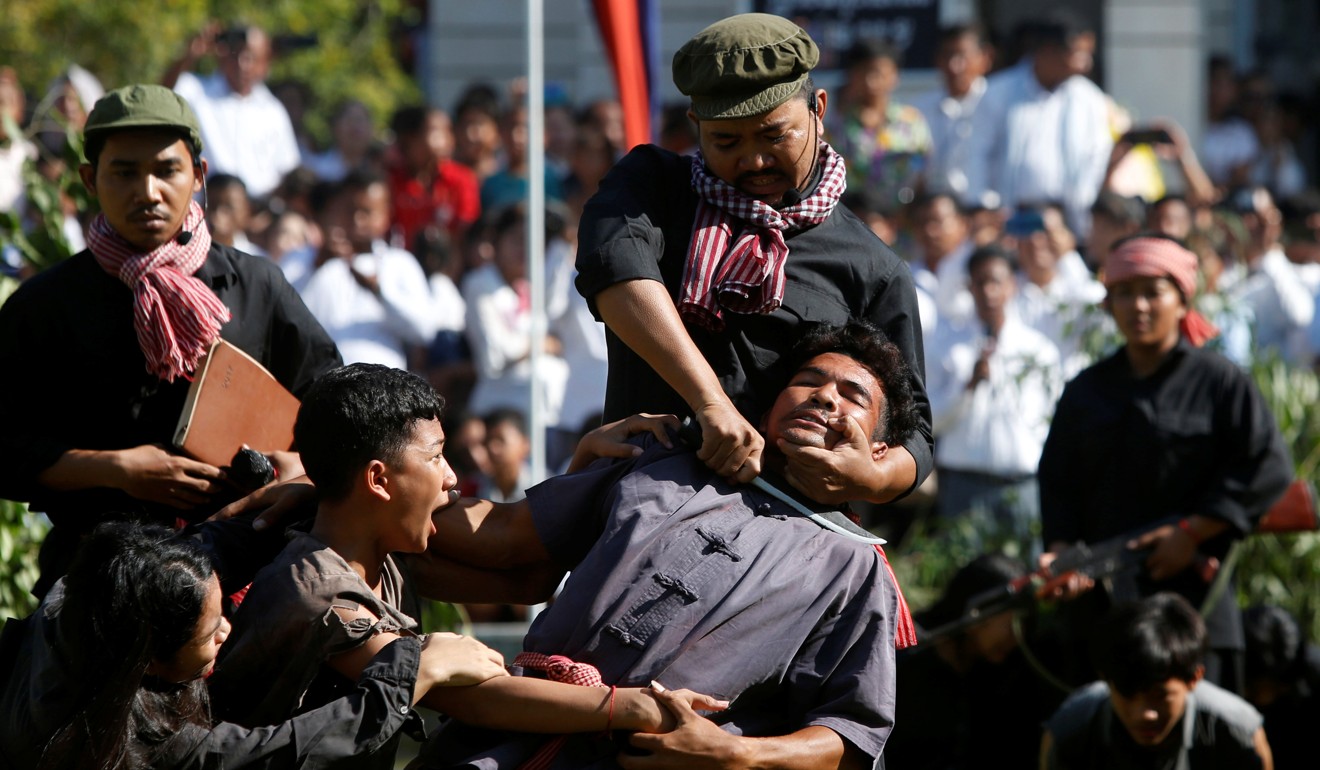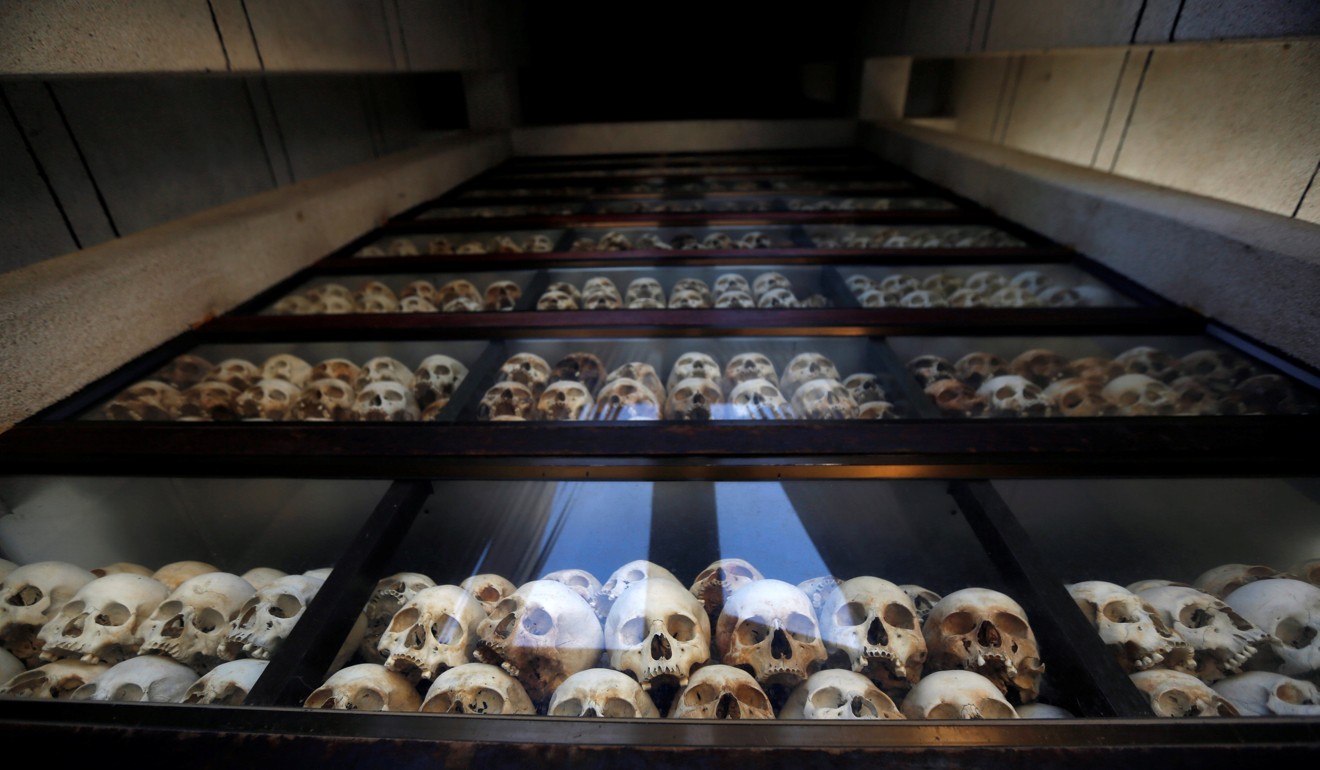Singapore moves to soothe row over PM Lee Hsien Loong’s Vietnam-Cambodia comments, denies sympathy for Khmer Rouge
- Cambodian leader Hun Sen has accused the island nation’s leader of ‘supporting genocide’ for his remarks on Vietnam’s 1978 invasion of Cambodia
- Vietnam has also protested, leading Singapore’s speaker of parliament to say it was their choice to ‘define the past as they see fit’

Singapore’s Foreign Minister Vivian Balakrishnan on Friday called the deputy prime ministers of Vietnam and Cambodia to soothe their grievances over Singaporean Prime Minister Lee Hsien Loong’s description of the former’s 1978 invasion of the latter to end Pol Pot’s “killing fields” regime.
A statement from the island nation’s Ministry of Foreign Affairs said Lee’s comments last week reflected Singapore’s long-held position, and this did not mean it had sympathy for the Khmer Rouge or had wanted to see it return to Cambodia.
Tensions rose earlier this week after Cambodia’s defence minister and Vietnam’s foreign affairs ministry disputed Lee’s use of “invasion” and “occupation” to refer to Vietnam’s action to oust the Khmer Rouge and install a new government.
In a further escalation of the row, Cambodian Prime Minister Hun Sen took to Facebook on Thursday night to accuse Lee of supporting the regime, which killed between 2 and 3 million people between 1975 and early 1979.
Watch: Khmer Rouge survivor recalls forty years since evacuation
“His statement reflects Singapore’s position then in support of the genocidal regime and the wish for its return to Cambodia,” Hun Sen said.
The controversy has revealed how differences in views of sovereignty and the idea of good fences making good neighbours persist among Asean, a point acknowledged by the Singaporean foreign ministry’s statement.
Vietnam’s invasion on December 25, 1978 was strongly opposed by Singapore, which played an active role in marshalling four other countries from the Association of Southeast Asian Nations to lobby for Vietnam’s isolation at international forums such as the United Nations and the rejection of the government it installed in Phnom Penh.

The island state saw Vietnam’s advance into Cambodia as an act of international aggression that, if tolerated, would have undesirable implications for its own sovereignty.
Southeast Asia was also driven by cold war hostility at the time, and Singapore was among the countries – including Thailand and the United States – active in blocking the spread of communism.
The Khmer Rouge was backed by China while Vietnam was supported by China’s communist foe, the Soviet Union.
Lee’s comments were part of his tribute to Thailand’s late former prime minister General Prem Tinsulanonda last week, though he made similar remarks at a security summit later that day.
Prem’s efforts with Asean partners “prevented the military invasion and regime change from being legitimised”, Lee said: “It protected the security of other Southeast Asian countries, and decisively shaped the course of the region.”
But Cambodia’s Hun Sen retorted that Lee’s words were an “insult to the sacrifice of the Vietnamese military volunteers who helped to liberate Cambodia”.

He added: “His statement reveals to the Singaporean people and the world that the leader of Singapore had indeed contributed to the massacre of Cambodian people.”
Hun Sen was a junior member of the Khmer Rouge but fled to Vietnam when the group split. He returned with the Vietnamese army that intervened in late 1978 to oust Pol Pot’s Khmer Rouge and rose to power in a government set up by Vietnam.
Tan Chuan-Jin, a former Singapore army general and now the speaker of Parliament, had on Friday responded to the broadsides issued against Singapore, though he singled out Vietnam and did not mention Cambodia.
The events in Indochina at the time preoccupied Singapore’s security agencies, and those involved would know that the threat of communism and its spread southwards were grave concerns, he said on Facebook.
“Vietnam may not like some of the comments made by PM and I guess they can choose to define the past as they see fit. This doesn’t change the past as many view it. Nor does it detract from us being good friends or neighbours today,” he added.
Through the 1980s, Singapore, Thailand and other Asean and Western countries recognised Cambodia’s three-faction “coalition government” in exile, which included the Khmer Rouge.
The factions battled Vietnamese forces in Cambodia from sanctuaries on the Thai border.
The Singapore foreign ministry’s statement noted that in 1988, Asean had sponsored resolutions at the United Nations to condemn the Khmer Rouge and to ensure it would not be part of any eventual government in Cambodia.
Singapore and Asean were also keen to provide humanitarian assistance to Cambodians, it said.
Vietnam withdrew its forces from Cambodia in late 1989, paving the way for a 1991 treaty that officially ended the war. Vietnam joined Asean in 1995 and Cambodia joined in 1999.
Singapore valued its relationships with Vietnam and Cambodia and had worked hard to set aside differences, the statement said.
“An understanding of the past enables us to fully appreciate and value the good relations that we now enjoy,” the foreign ministry added.
Additional reporting by Reuters